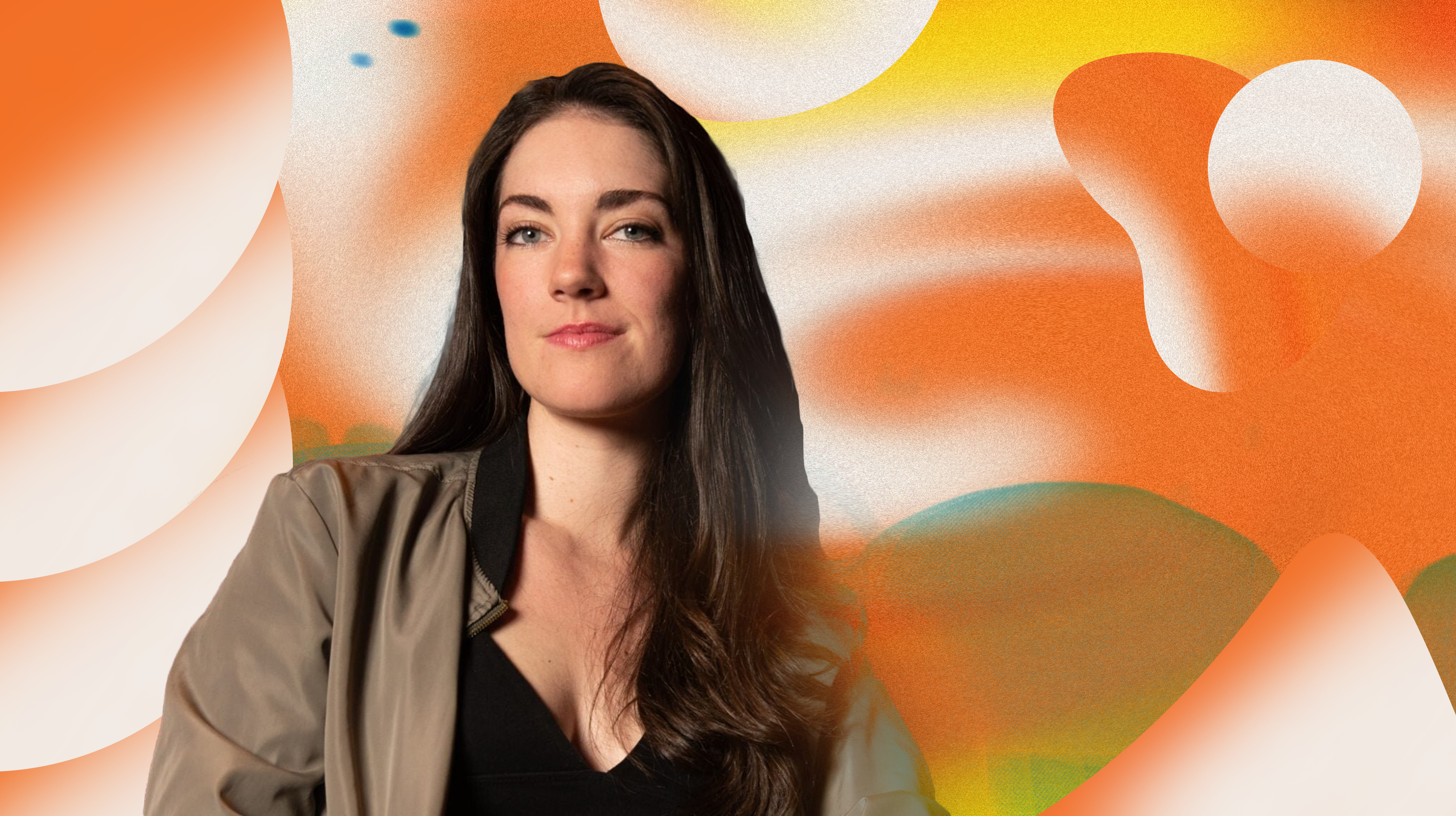Sitting on a rustic porch, Clare Cooney describes her move west...
Chicago-bred talent, Cooney had always wondered what it’d be like tapping into the bigger market of Los Angeles. She’d planted strong roots in Chicago, including guest starring in Chicago PD, graduating from the acclaimed Steppenwolf program, and creating her own award-winning short film. She was ready for a change.
Her reps gave her push back. They didn’t believe that she was ready - that she hadn’t done well enough in Chicago to justify moving onto a bigger market. They voiced their concerns about the transition. Yet, Cooney knew innately that she had to move on. She recognized that the timing was right.
“Ultimately, I had to listen to my gut,” says Cooney.

Clare Cooney directing on set of Dad Man Walking | Clare Cooney
Raised in a “rational environment”, Cooney grew up with a family of lawyers.
In high school, she’d acted in plays, but was still drawn towards financial security. As a result, she studied Psychology at the University of Notre Dame. However, while shopping around for other potential interests, she quickly realized that the classes she chose leaned towards a single direction. In fact, she’d accumulated enough credits for a major in Film, Television, and Theater.
She hadn’t intended to pursue the arts, but upon graduation, Cooney had a frank and open conversation with her friends and family. After much discussion, she decided that she wanted to try her hand at acting. Chicago was the logical step.
“I thought Chicago was a really accessible way for someone green like me to start. It felt like a slightly smaller pool - a more homey and approachable city,” says Cooney.
At six foot one, Cooney began realizing that auditions were writing her off for being taller than her potential co-stars. Furthermore, although the Chicago theater scene is undoubtedly vibrant, she found that she wasn't playing big enough for the stage, with her natural affinity for subtlety and smaller facial movements.
So, she found herself on more and more film sets.

Movie Posters for Bird of Prey (pictured left) and Runner (pictured right) | IMDB
She found a natural collaborator in filmmaker Marion Hill on the production of Bird of Prey.
“I felt really comfortable on that set, so it was a place where I could play and make mistakes without there being any kind of judgment,” Cooney remembers. “Marion and I had this weird connection where we understood each other.”
Prior to the experience, Cooney had worked on several short films and had taken an on-camera class at the Steppenwolf and a Cinema Lab class by Chicago director Stephen Cone. However, she hadn’t gotten many opportunities to act in front of a camera.
“You get a lot of auditions for student films where it’s like ‘oh God, I’ll audition for this because I need the material’,” she notes. “But, when I went into Marion’s short film, I could tell right away that it was just gonna be a different kind of experience.”
Making the short film ultimately proved to be an incredibly empowering experience for Cooney, as she began to slowly trust herself in the process. She also credits Hill with bringing her up throughout their organic collaboration, as several of her choices were directly integrated into the finished project. Ultimately, both Hill and Cooney ended up becoming good friends.
“If the project hadn’t been done with as much care as it had been and if it didn’t have the same film festival trajectory that it had,” Cooney adds, “I really don’t think that my filmmaking or my acting career would be in the place that it currently is.”
Clare Cooney stars in Bird of Prey | Lesbian Lips
As Cooney grew more and more confident in her acting abilities, she soon found herself wanting more from the roles she took on. Additionally, she found herself becoming more and more in tune with the behind-the-scenes work of film production. Shortly after her collaboration with Marion Hill, Cooney began work on Runner, a film about a jogger who experiences something she can’t run away from.
While the project was initially intended to give her a more satisfying experience as an actor, she ended up tremendously enjoying filmmaking as a whole.
The short, written, directed, and produced by (as well as starring) Cooney, has since gone on to play at Academy Award-qualifying festivals and accumulate over 850,000 views on Omeletto. Nonetheless, creating the film as a multi-hyphenate on set proved to actually be an asset for Cooney.
“I was so focused on producing it with the logistics and making sure that the shots were good that I had no time to think about my performance,“ Cooney recounts with a laugh.
Since Cooney did most of the prep work in writing and devising the story, she was fully able to snap into the character. All she had to do was remain present.
Clare Cooney's directorial debut Runner | Omeleto
Music brings Cooney a lot of joy. It reminds her of singing goofy show tunes with her friends in college and listening to songs that helped pull her through some difficult life moments. So, it’s no surprise that music plays such a central role in the premise of Runner. In the starting scenes, a murder takes place to the backtrack of the vibrate poppy beat of “Electric Love” by BØRNS.
“I really love in horrors or thrillers when someone's being tortured and you're hearing a really upbeat pop music over it,” Clare comments. “I think that that's really kind of tasty and satisfying.”
Licensing pop songs is a notoriously difficult and costly proposition. Going through the traditional channels, Cooney was initially quoted a figure that she could never afford. Yet, the song had become so integral to the structure of her film. In fact, the entire first half of the film was entirely cut to the beat of the pop song.
Cooney persisted. She politely asked and noted that she was a young rising female filmmaker. She even reached out to one of the four initial songwriters on Instagram, sending him Runner and asking for support. Eventually, he agreed and Cooney was able to negotiate down the price.
All in all, it took almost nine months to license a single song.
“That song was still, by far, the most expensive part of the film,” Cooney states, “but, for me, it was really worth it.”

Clare Cooney in Pick Up, a short film that she wrote, directed, edited, and starred in during the COVID-19 Pandemic in Los Angeles | Clare Cooney
In 2020, Cooney said: “Plenty of filmmakers, including myself, can feel strung out and underpaid, juggling multiple jobs, trying to find time to create art on the side. If we want art to be created by a diversity of voices, there needs to be more support, financially and structurally, and there simply needs to be more Chicago-made work on a consistent basis.”
When asked if things have changed in the two years since, Cooney isn’t so sure. She points to Saint Frances and the fact that although it was one of the biggest independent films to have come out of Chicago in recent years in terms of national success, the film had a large number of producers on board. To Cooney, this is indicative of how hard the team had to struggle to work and scrape for every dollar.
“I think the money exists. I just don't know who to go to - it doesn't feel like there are clear paths towards it,” Cooney concludes.
Not only is it difficult to navigate the limited filming resources in Chicago, but Cooney also feels like the resources themselves are scarce. She’d like to see more investments made towards Chicago projects, created by Chicago directors, crew, and talent. She points again to the success of Saint Frances and notes that resources can be better spent on local homegrown projects rather than productions that move in from the coasts and helm productions.

Movie Poster for Relative, a Chicago-made feature film that Cooney starred in and casted for | Relative
Having made the move towards the beginning of the COVID-19 pandemic, Cooney now splits her time between Chicago and Los Angeles. Nonetheless, she calls in today from Detroit, admitting that she’s recently been “all over”. While moving to find a better connection for our interview, she apologizes for the possibility of being interrupted by her nieces and nephews.
Cooney’s roots are essential to her. In fact, since she’s moved to California, she still finds herself getting calls for Chicago gigs - even more so than before.
Nothing’s changed for Cooney except her zip code, yet her move to Los Angeles had made her appear more impressive to Chicago casting - a falsehood that she encourages the Chicago film scene to dispel in favor of uplifting local talent. It’s sentiments like these - an ethos of uplifting her community and collaborators in Chicago - that drives the new feature film that Cooney is directing.
Her new project, Departing Seniors, is a low-budget independent dark-comedic horror thriller set in a Chicago high school. The cast will comprise primarily Chicago-based talent and channels the stylistic influences of Wes Craven in a classic high-school setting reminiscent of John Hughes.
“I know I'll be in Chicago for the rest of my life,” says Cooney. “Like, I know I'm gonna keep coming back to work in Chicago. I think there's a world in which I'll move back to live full-time one day. But, for now, I'm really enjoying the whole bi-coastal experience.”

CLARE COONEY is a SAG actor and filmmaker currently living in Los Angeles. Most recently she recurred as Bridget on The CW series 4400 and guest starred on NBC's Chicago Med. As a filmmaker, she wrote, directed, edited, and starred in Runner, a short film that played at 15 film festivals, winning 6 awards and garnering Cooney a “Filmmaker to Watch” nomination from the Oscar-Qualifying Atlanta Film Festival. Her latest short films After (A Love Story) and Pick Up have both played at Oscar-Qualifying festivals. She also directed and edited Dad Man Walking, a pilot that won Best Short Drama at Catalyst Content Festival '19 and Go Ahead, Grab Time By The Throat, which received a special feature in Roger Ebert. She made Newcity magazine's Film 50 list in 2020 and 2019 for being “one of 50 individuals who shape Chicago's film scene.”



